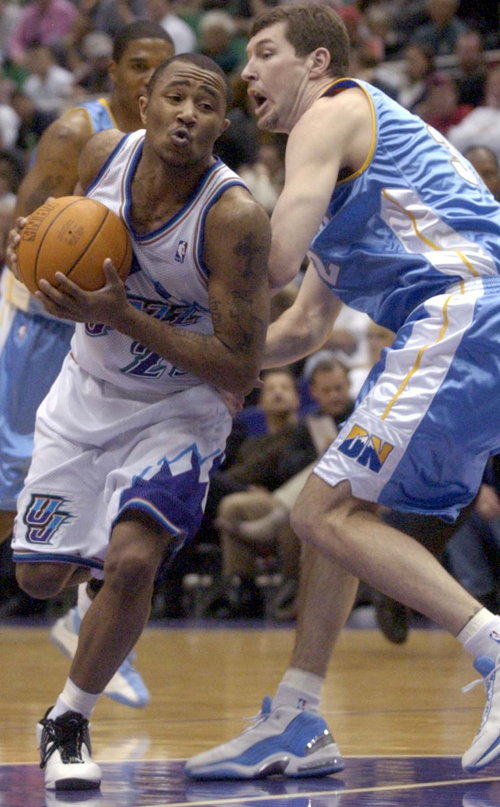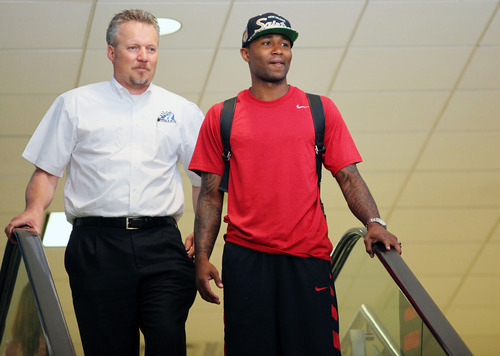This is an archived article that was published on sltrib.com in 2012, and information in the article may be outdated. It is provided only for personal research purposes and may not be reprinted.
What lockout?
That's the question underlining the start of NBA free agency, which has seen maximum contracts and back-loaded offer sheets eagerly handed out like the 2011 work stoppage and threat of a nuclear winter never happened.
Just four days into the 10-day moratorium period — when deals can be negotiated but not officially signed — everyone from Deron Williams and Eric Gordon to Roy Hibbert and Kevin Garnett has tentatively agreed to massive long-term paydays, while Steve Nash, Goran Dragic and Jeremy Lin are expected to soon be rewarded with several years of serious financial security.
Utah hasn't been Brooklyn. But the Jazz have been busy, and the small-market organization has pulled off two major deals without digging a huge financial hole. Recently acquired point guard Mo Williams' $8.5 million contract is expected to be offset by the planned Devin Harris ($9.3 million) trade.
Meanwhile, Marvin Williams' $7.5 million contract doesn't come close to pushing Utah into the luxury tax, allowing the Jazz to still use their full $5 million midlevel exception (MLE) on free agents.
Relying on well-timed trades and loaded with valuable expiring contracts, Utah General Manager Kevin O'Connor has finally kicked off a run of transactions that have long been in the making. The Mo Williams trade and Harris deal came within 72 hours of each other.
After watching Utah have its "bell rung" by San Antonio in the first round of the 2012 playoffs, O'Connor was instructed by the Miller family to be aggressive this summer. The second-longest tenured GM in the NBA has followed his orders to the letter, and he has sounded downright excited — a rarity for the tight-lipped O'Connor — when discussing the Jazz's amped-up pace.
"Our market is Salt Lake," O'Connor said. "Our ability to get players is not limited, because we can spend the money. But maybe the types of players [is limited] sometimes, outside of the draft. So what we've tried to do is look under every rock to see how we can do some of the things, and I feel fortunate that we've been able to do that."
For years, O'Connor quietly fine-tuned the Jazz's roster, setting it up for a 2011 collective bargaining agreement that will begin heavily penalizing tax payers in 2013-14. The 2011 Deron Williams trade ignited Utah's youth movement. The expiration last June of Andrei Kirilenko's now-unthinkable six-year, $86 million maximum contract allowed the Jazz to turn an essential financial corner.
Now, any move O'Connor makes is geared toward July 2013, when Utah could have just four young players under rookie-scale contract at the same time superstars such as Chris Paul and Dwight Howard become free agents.
Even if the Jazz sign forward Paul Millsap to an extension this summer, they'll still have the flexibility to add several key players for the next several years, thanks to a payroll that's remained above the salary cap but below the tax during the past year.
"I couldn't be happier with the job Kevin has done to literally lead us through what appeared to be a crisis into … a future for the Utah Jazz that's a very bright future," president Randy Rigby said. "An exciting future that's a mix of some solid veteran players and a mix of also very strong young players that have a lot of potential for us."
Post-John Stockton and Karl Malone, the Jazz's initial answer was to overspend in the attempt to compete with NBA large-market teams such as the Los Angeles Lakers. Utah advanced to the Western Conference finals in 2007.
But early playoff exits followed the next three seasons, and a franchise that has never won an NBA title hit a crossroads in 2011, when longtime coach Jerry Sloan suddenly resigned and Deron Williams was traded.
O'Connor didn't waver, though, and his perseverance is paying off. On paper, the 2012-13 Jazz are the deepest and most athletic team Utah has produced in five seasons. And with an unspent MLE and the potential for sign-and-trades or straight deals still remaining, this season's Jazz could be even stronger when the new year tips off.
"Our objective is to always be on the lookout for opportunities to improve our ability to win. And sometimes opportunities arrive that we weren't counting on, and so that can happen at any time," Utah CEO Greg Miller said. "Kevin's always on the lookout for something — you never know when something's going to break loose."
Twitter: @tribjazz
Check The Tribune's Jazz Notes blog at sltrib.com/Blogs/jazznotes for exclusive news, interviews, video and analysis. —
NBA free agency
The moratorium period began July 1 and ends July 10. During this nine-day stretch, teams can negotiate with players and agents, but contracts are tentative. Deals can officially be signed July 11. —
Big moves
The Jazz have pulled off two major deals without signing anyone. Utah acquired veteran point guard Mo Williams via a four-team trade that saw the Jazz send a trade exception to Dallas. Utah also has a planned deal that will ship Devin Harris to Atlanta in exchange for Hawks forward Marvin Williams. —
Summer league
July 9-13 in Orlando, Fla.





